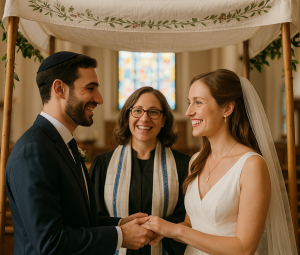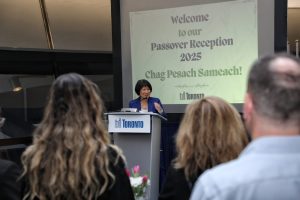 TORONTO — A Palestinian who might have been angry, bitter and vengeful over a profoundly personal tragedy delivered a poignant message of forgiveness, love and brotherhood last week.
TORONTO — A Palestinian who might have been angry, bitter and vengeful over a profoundly personal tragedy delivered a poignant message of forgiveness, love and brotherhood last week.
Dr. Izzeldin Abuelaish [Sheldon Kirshner photo]
Nearly a year after two Israeli tank shells slammed into one of his bedrooms and killed three of his children in a senseless incident that deeply embarrassed Israel, Dr. Izzeldin Abuelaish, a 54-year-old Palestinian physician from the Gaza Strip, stood in a Toronto synagogue preaching the virtues of reconciliation, dialogue and non-violence.
“We choose the path of light rather than to live with hatred and be consumed by revenge,” he declared in an affecting speech Nov. 17 at Beth Tzedec Congregation. “Violence is not the solution.”
Currently an associate professor of medicine at the Dalla Lana School of Public Health at the University of Toronto’s faculty of medicine, he was the guest of honour at an unusual interfaith gathering sponsored by a coalition of Canadian organizations.
Abuelaish, the son of Palestinian Muslim refugees displaced from their homes, was praised by a procession of admirers before delivering his talk.
Norman Kahn, president of Beth Tzedec, described him an an “extraordinary” person. Israel’s consul general in Toronto, Amir Gissin, called him “a hero of our two nations” who has displayed “incredible strength and determination.”
Mark Persaud, president of the Canadian International Peace Project, hailed him as a “remarkable” individual, while Dr. Arnold Noyek, founder of the Canada International Scientific Exchange Centre for International Health, said he was an “inspirational” figure who has brought together Israelis and Palestinians.
Abuelaish, who has practised medicine in Be’er Sheva and Tel Aviv, was at his home in the Jebaliya refugee camp when his life changed in an acrid flash.
Last winter, after its shaky ceasefire with Hamas broke down and the Islamic fundamentalist group continued firing rockets at Israeli communities across the border, Israel invaded Gaza.
As Israel’s forces drove deeper into Gaza during the three-week war, a pair of Israeli tanks hit a three-storey residential building where Abuelaish and his family resided.
To this day, the strike has yet to be fully explained, but the upshot of it was that three of his six daughters – Bisan, 20, Mayar, 15 and Aya, 13 – were killed.
The shells also struck down their cousin, Nour, 14, and injured another one of Abuelaish’s daughters, Shatha, who was 16 at the time.
On that dark day, barely four months had elapsed since he had lost his wife, Nadia, to the ravages of cancer.
In the wake of the incident, he phoned an Israeli friend, a journalist, and an ambulance was sent to transport the injured girls to a hospital in Israel.
“It is hard to describe that dreadful scene,” Abuelaish said as he launched into his simple and moving speech. “I wouldn’t want anyone to see what I saw,” he added in a reference to his daughters’ splattered body parts.
Astonishingly enough, Abuelaish, who has said he raised his daughters to be “soldiers of peace,” was not embittered by their deaths.
“Life must continue and we must keep moving,” mused Abuelaish, who arrived in Toronto last July and is here on a five-year contract. Speaking as a doctor, he observed, “We must focus on prevention, not treatment.”
Accentuating the positive, he said he was blessed by the fact that the shells spared his other daughters, one of whom accompanied him to Beth Tzedec.
Somehow rising above his anger, he said that justice, trust and peace can lead Israelis and Palestinians to a better future. Although he was short on specifics, he suggested that a two-state solution is the answer.
Contending that the dispute is perpetuated by mutual mistrust and suspicion, he urged both sides to concentrate on saving lives, building an atmosphere of forgiveness and trust through dialogue, learning to know each other and dispensing with the blame game.
After he finished, Jacqueline Swartz of Canadian Friends of Peace Now and Donna Holbrook of the Christian Embassy in Jerusalem heaped praise on him.
Shahid Akhtar, co-chair of the Canadian Association of Jews and Muslims, issued a challenge. “We can’t allow his sentiments to melt into thin air,” he said, urging dialogue between Jews and Muslims.
At this point, members of the audience, seated around numbered tables laden with Middle Eastern sweets, were asked to reflect on Abuelaish’s comments and contribute questions for his consideration.
Asked how he is perceived in Gaza, he claimed that his fellow Gazans are proud of his efforts to break down Arab-Israeli barriers.
After being asked what he has taught his daughters about Jews, he coaxed one of them to the podium, a painfully shy 10-year-old girl named Raffah whose head did not even reach the microphone, and in halting Hebrew she said, “I love you.”
The evening ended in an aura of optimism, as Rabbi Baruch Frydman-Kohl, Beth Tzedec’s spiritual leader, described Abuelaish as a “very noble soul” and expressed the hope that his words would foster “dialogue” and “constructive action.”
The event was sponsored by the Canada-Israel Committee, the Canadian Association of Jews and Muslims, the Canadian Council for Israel and Jewish Advocacy, the Canadian International Peace Project, the Canada International Scientific Exchange Program, Hillel of Greater Toronto, Holy Blossom Temple, Canadian Jewish Congress, the International Christian Embassy Jerusalem, Rebuilding Shattered Lives, Kids 4 Peace, Peace Now, the New Israel Fund of Canada, Neighbourhood Interfaith Group, Save A Child’s Heart and the Danforth Jewish Circle.






